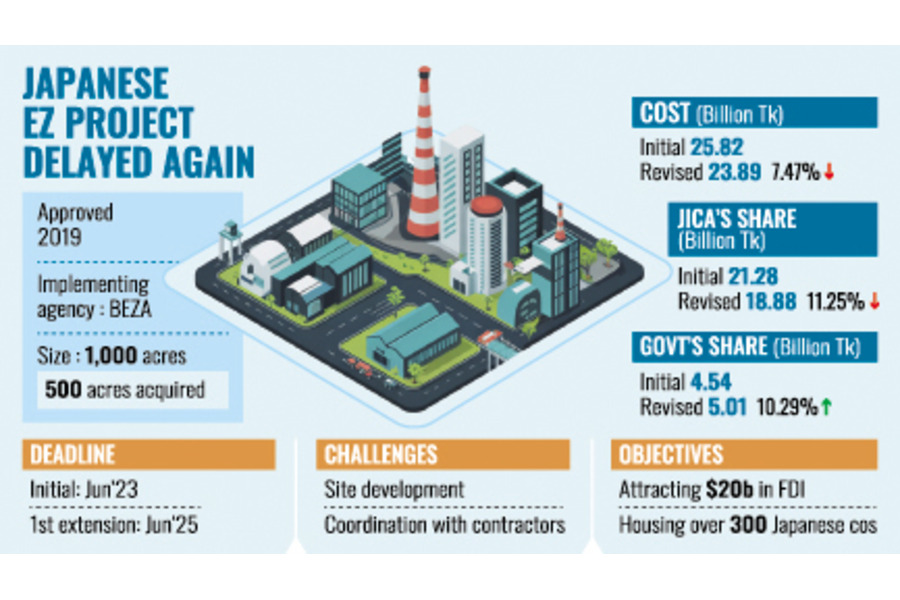
Published :
Updated :

The much-hyped Japanese Economic Zone project at Araihazar in Narayanganj is heading for another two-year extension, with the Chief Adviser's Office now seeking a second revision to complete the pending infrastructure works.
Approved in 2019 with a June 2023 deadline, the project aimed to attract $20 billion in foreign direct investment (FDI) and house over 300 Japanese companies.
As it could not be completed, the deadline was extended till June 2025.
Even the extended deadline has expired, and the project is still incomplete.
The Planning Commission's Industry and Energy Division recently convened a meeting of the Project Evaluation Committee (PEC) to review a proposal from the Chief Adviser's Office, officials said.
During the session, PEC members questioned the justification for increased costs of land acquisition and access road development, though the size of the components was set to be reduced.
They also sought explanations for the proposed fees for certain consultants to be engaged in the feasibility study and other tasks planned for another project in the future.
Officials present at the meeting said the Planning Commission had expressed concern over the proposal, noting that it sought higher allocations from the government treasury for some components, while reducing loan support from the Japan International Cooperation Agency (JICA).
The proposal shows the project's initial cost, estimated at Tk 25.82 billion, is set to be reduced by 7.47 per cent to Tk 23.89 billion.
JICA pledged Tk 21.28 billion in support for the project, but its contribution would drop by 11.25 per cent to Tk 18.88 billion under the revised plan.
To bridge the financing gap, the government is expected to allocate Tk 5.01 billion - 10.29 per cent higher than originally planned.
Sources said the PEC had endorsed the proposal and recommended placing it before the Executive Committee of the National Economic Council (ECNEC) for final approval.
The Japanese Economic Zone, once completed, is expected to provide a favourable environment for Japanese and local investors alike.
The Bangladesh Economic Zones Authority (BEZA), the implementing agency, believes the project will attract significant FDI, create jobs, and strengthen bilateral economic ties between Dhaka and Tokyo.
In 2015, Bangladesh and Japan signed a loan agreement to finance the project.
Nearly a decade later, however, the zone remains incomplete, and Japanese investors who showed keen interest are yet to begin operations.
"The delays are undermining confidence among investors who anticipated world-class facilities," a Planning Commission official said. Experts also stress that the success of this zone is crucial for Bangladesh's investment climate.
With foreign investment inflows already below expectations, ensuring timely delivery of flagship projects like this one is critical, they say.
Officials said BEZA had faced multiple challenges ranging from site development hurdles to coordination problems with contractors.
While progress accelerated in recent months, officials admit that more time is needed to ensure the completion of utilities, roads, drainage systems, and other industrial infrastructure.
Economists warn that repeated project delays not only inflate overhead costs but also erode the credibility of government commitments to foreign investors.
"Investors value predictability above all. If flagship projects keep dragging on, it risks sending the wrong signal," said an analyst familiar with FDI trends.
Bangladesh Special Economic Zone (BSEZ), dedicated to Japanese investors, is being established on 1,000 acres of land in Araihazar.
The country's first-ever economic zone under the government-to-government initiative is expected to bring in foreign investment of $20 billion.
With this plan in view, the acquisition of 500 acres of land has already been finished, and the rest is in process.
jahid.rn@gmail.com


 For all latest news, follow The Financial Express Google News channel.
For all latest news, follow The Financial Express Google News channel.